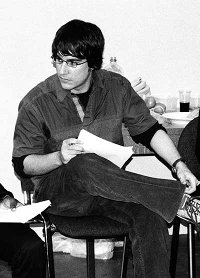A playwright is the person responsible for writing dramatic material for the purposes of performance within the theatre.
The script is the blueprint for creating a dramatic production.
A script for a play is the road map to creating a successful and complete theatrical production.
The playwright will take an original concept or idea and use dramatic devices such as storytelling and the creation of dialogue to turn the concept into a complete story.
The script is then given to the production company, who will hire cast and crew to enable them to develop a full production.
Sometimes, the playwright’s involvement in the creation process will end with the transfer of the script to the production company.
In other cases, the playwright may be asked to remain with the production as a production assistant or technical director to enable a successful interpretation of the dramatic script.
A playwright will need to immerse themselves in the work of others, keep informed with current events which may have implications for their story concepts and generally see as much theatre as possible.
It is a competitive industry with a lot of talented people who are struggling to be noticed.
The job is largely freelance, and most playwrights will supplement their income from commission of their plays with a day-job or teaching work in dramatic circles.
Salary
Contrary to common belief, playwriting is not particularly well paid.
The Writer’s Guild recommended minimum for a full-length stage play (70+ minutes) is around £6,500.
That might sound like reasonable remuneration, but the creation of material might represent 6-12 months work, and most playwrights realise that they cannot live on commissions alone.
A dramatist would need to take on four commissions a year to make a salary comparable to the national average, which is an impossible workload for most writers.
There is also nothing legally enforceable about that amount, so many theatres elect to pay less.
TV writing work does pay a lot more, but the trade-off is that the writer is not entrusted to write their own dramas without doing many years of hard work churning out soap opera episodes or similar beforehand.
Responsibilities
- Work to deadlines to deliver good quality, original dramatic scripts.
- Rewrite as per critical feedback on creative ideas, from “dramaturgs” (sometimes called ‘script editors’) to directors and actors.
- Collaborate with the production team to turn the ‘map’ (play script) into something for actors to follow.
- Be open to working in groups without getting defensive about their own work and the ways it can change.
- Responsibility to know what other plays are out there, both currently and historically, and to keep updated on current affairs.
- The playwright’s ultimate responsibility is to their audience. The writer must have something interesting to say, and say it in a unique way.
Qualifications
Playwrights trade on their writing ability, so there are no formal academic demands.
However, an A-level equivalent in English or Drama can be helpful for equipping the playwright with the technical knowledge and observational ability which will enable them to write at a high level.
In terms of “informal” studies or certificates, there are many groups and short courses which seek to serve the aspiring playwright in giving them the technical ability with which to succeed.
Often the best course of learning is to see as many plays as possible, and to study the written or dramatic work of other writers.
Skills
- A strong grasp of English and grammar is requisite.
- A good analytical mind helps the playwright dissect the dramatic work of other writers.
- A good understanding of storytelling and dramatic arrangement are crucial in putting together a strong script which is marketable.
- The ability to self-promote and be pro-active with one’s own time is also paramount.
Working Conditions
Most playwrights work from home, and so the working environment can be as chaotic or as calming as desired.
Some choose to journey to places of particular interest or stimulation to trigger the motivation to write dramatic prose or story ideas, whereas other writers will only find distraction and noise outside of their own writing environment.
Many need to fit their writing around other more “normal” job commitments.
Experience
Some writers are phenomenally successful and receive several high-profile productions a year, while some spend their entire careers making a low-profile living in smaller venues, community settings, working outside London or in a specialised field like writing plays for children.
Some writers move abroad, into TV, or academia.
Many have another ‘main’ job and only occasionally write plays.
A lot of the paths to personal development in this arena will depend on where the playwright’s priorities lie, the sort of work they wish to produce and for whom.
Image

Also known as…
- Dramatist
- Theatre script writer
Related Jobs
- Theatrical director
- Theatrical producer
- Theatre lighting technician
- Theatre sound technician
- Script editor
What’s it really like?
Fin Kennedy is an award-winning investigative playwright and teacher of playwrights.
He is currently developing a play for Birmingham Rep and a piece for the 2011 Brighton Festival.
What made you decide to choose to get into this sort of career?
It started as an interest in acting at school, then became an interest in directing, before finally realising that the playwright is the person with whom it all begins.
I’ve always loved language and stories, but in particular I love the idiosyncrasies of spoken language, and seeing a story played out by real human beings in the same room.
I love theatre’s collaborative nature, and the fact that even in this technological age, it is still flourishing as one of the last remaining arenas where the British public comes together en masse to consider the big issues of the day.
As my career has evolved, I’ve also come to appreciate the freedom, flexibility and variety of a freelance creative working life.
Do you have a standard day or a standard type of `exercise’?
When I’m on deadline for a commissioned script, I get up with the rest of the world and treat my writing day as a regular 9 to 5, Monday to Friday.
I have a spare room at home which doubles as a study, but in the early days, I’d just write wherever there was a desk.
I need quiet, and can’t write anywhere public.
I structure my stories very thoroughly before writing a word of dialogue, so I will often spend some time putting together prose treatments and scene plans, which I then pin to the wall above my desk to follow like a map.
Quite often, you’ll be out for meetings with literary managers or artistic directors of theatre companies discussing new ideas or discussing re-writes of existing scripts.
Other tasks might include proofing the publisher’s copy of your script, giving interviews to journalists in the build-up to your play opening, or even writing articles about it yourself.
What is the most common type of problem/call-out/enquiry you must attend to?
Most problems in this line of work arise within the world of a play you are developing, for example structural problems with a story.
Sometimes there can be disagreement with a commissioning company about the direction a play has taken, but these are thankfully rare.
Most theatre companies trust and support their writer’s decisions, though in TV they are more likely to interfere.
If you get conflicting sets of advice about a play, it is sometimes hard to know which is the right one to follow.
The trick is to stick to your vision for the play and the story you most want to tell.
What do you like most about the job?
I like the freedom to write about whatever I like, and that I’m using my creativity and imagination all day, every day.
I love the world of the theatre and going to see plays all the time, as well as seeing my own plays come together in the rehearsal room, and what incredible depth and insight actors can bring as they take a play off the page.
I also love sitting in the audience anonymously and sensing how something I’ve written is being received by those around me.
I love stage images and metaphor, and the power they have to move an audience and make them see the world differently, or walk a mile in someone else’s shoes.
I love too how political theatre can be, and its ability to illuminate the great issues of the day through the prism of human stories.
What do you like least about the job?
Playwrights who choose to work outside the theatre in search of more lucrative jobs in TV give up a huge amount of creative control to producers, and can be replaced even on an idea which they had come up with.
There’s also a trend nowadays towards ‘development culture’, which can involve endless meetings, workshops and rehearsed readings of a play.
While these can be useful tools, they can sometimes be a way of throwing writers a bone – ie. a consolation prize for theatres to feel like they have fulfilled their obligations to you when in fact they should be giving you a full production.
All these things are a product of playwriting being over-subscribed; there are simply more plays and playwrights than production slots available.
It’s incredibly competitive.
What is the starting salary and how does this increase over time with promotion?
I personally make only about £10-12,000 a year from commissions, but nearer to £20,000 from a wide portfolio of teaching and lecturing, including working as a writer-in-residence in a London secondary school.
While it’s true that commission fees do go up when you move into the higher echelons, or you get incredibly lucky and get a West End or Broadway transfer, this applies to maybe 5% of playwrights.
If you left this position, what else would you consider/prefer doing?
I’d probably be a university Drama tutor and arts journalist.
What advice do you have for someone who is looking to get into this as a career?
See as much theatre and read as many scripts as is possible.
Keep writing, no matter what.
Develop an unshakeable belief in the quality and importance of your own work.
Don’t fixate on the Big Five writing venues in London (Royal Court, National, Soho, Hampstead, the Bush) as there are many more companies across the country that will produce your work. Be proactive about creating your own opportunities.
Make friends with some directors and actors and get them to read your work aloud while you listen.
Apply for funding to put your own work on in a fringe theatre or found space, or cajole your unemployed actor friends to do it for free.
Look beyond yourself and your own lived experience for subject matter, especially after your first play.
Enter every playwriting competition going (I was plucked from obscurity by the John Whiting Award for a play that most theatres had turned down).
Make use of the free script reading service offered by Soho Theatre and others.
Get in touch with your local theatre and see what jobs they have going, even part-time.









